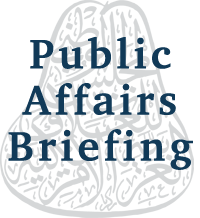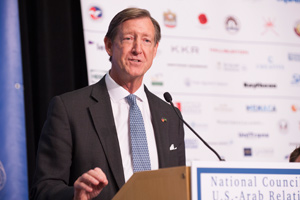 Below is a remarks as delivered transcript from a public affairs briefing held November 13, 2013, in Washington, DC, sponsored by the National Council on U.S.-Arab Relations, the U.S.-GCC Corporate Cooperation Committee, and Willkie Farr & Gallagher LLP.
Below is a remarks as delivered transcript from a public affairs briefing held November 13, 2013, in Washington, DC, sponsored by the National Council on U.S.-Arab Relations, the U.S.-GCC Corporate Cooperation Committee, and Willkie Farr & Gallagher LLP.
Featured Specialists:
Ambassador (Ret.) Ford Fraker – Former U.S. Ambassador to Saudi Arabia (April 2007 – April 2009); and Senior Advisor, Trinity Group Limited.
Ambassador (Ret.) James Smith – Former U.S. Ambassador to Saudi Arabia (September 2009 – September 2013); and Senior Counselor, The Cohen Group.
Moderator:
Dr. John Duke Anthony – Founding President and CEO, National Council on U.S.-Arab Relations.
[Remarks as delivered]
[Amb. Ford Fraker] Well, Dr. Anthony as usual has done an excellent job sort of laying the ground work, and I think one of the advantages of an audience like this is that Ambassador Smith and I get to talk to people who know a lot about what we’re talking about, and that facilitates the discussion. What we don’t – certainly what I don’t do well at is when I have to stand up in front of a group and put a map of Europe on the wall and then go from Europe down to Saudi Arabia, so it’s always nice to speak to an informed audience.

Ambassador (Ret.) Ford M. Fraker at the National Council on U.S.-Arab Relations’ 2013 Arab-U.S. Policymakers Conference. Photo: NCUSAR.
So what I want to do is to spend some time talking about the relationship and some of the key elements in the relationship that are relevant today for what’s going on so that we can get into the question and answer portion of this rapidly. I think it’s at that point that everybody gets fully engaged and we don’t have to stand up here droning on about various issues that may or may not be important to you. It’s always better to turn it over to the audience and find out what’s on their minds.
So a brief word about the relationship. When I arrived as Ambassador to Saudi Arabia in 2007, up to that point I’d been a banker in the Middle East for almost 35 years. So Saudi Arabia was a country I knew well. It allowed me to transition into the position relatively easily from a number of standpoints. But one of the things that surprised me when I came was I had no real understanding of the breadth and depth of the relationship between Saudi Arabia and the U.S.
Obviously the high points – energy for security – all the basic issues that drive the relationship, yes I knew about them. But the number of programs that exist encompassing Departments of Commerce, Energy, Education – a whole raft of programs that extend throughout the relationship, not just broadly, but deeply as I said, I think has a lot to do with why this relationship is as strong and as fundamentally sound as it is.
Some of you have heard me refer to the relationship as a marriage. All good marriages are based on sound fundamentals, strategic interests, shared values. I think that’s very much the case in Saudi Arabia. And in every strong marriage, good marriage, there are the ups and downs, but as long as those fundamentals are in place, and as I said as long as you have this depth and breadth of relationships operating then the relationship takes over.
I’m convinced one of the reasons the relationship did not break immediately after 9/11 was because of this, because of the number of programs that were in place, because of the day-to-day interaction was embedded. So from that standpoint I don’t worry about this relationship breaking. For sure, as I said, there will be ups and downs, and we’re in a particularly difficult period right now and there are a number of factors for that, and I wanted to mention two.
Continue reading »

 Below is a remarks as delivered transcript from a public affairs briefing held November 13, 2013, in Washington, DC, sponsored by the National Council on U.S.-Arab Relations, the U.S.-GCC Corporate Cooperation Committee, and Willkie Farr & Gallagher LLP.
Below is a remarks as delivered transcript from a public affairs briefing held November 13, 2013, in Washington, DC, sponsored by the National Council on U.S.-Arab Relations, the U.S.-GCC Corporate Cooperation Committee, and Willkie Farr & Gallagher LLP.
You must be logged in to post a comment.